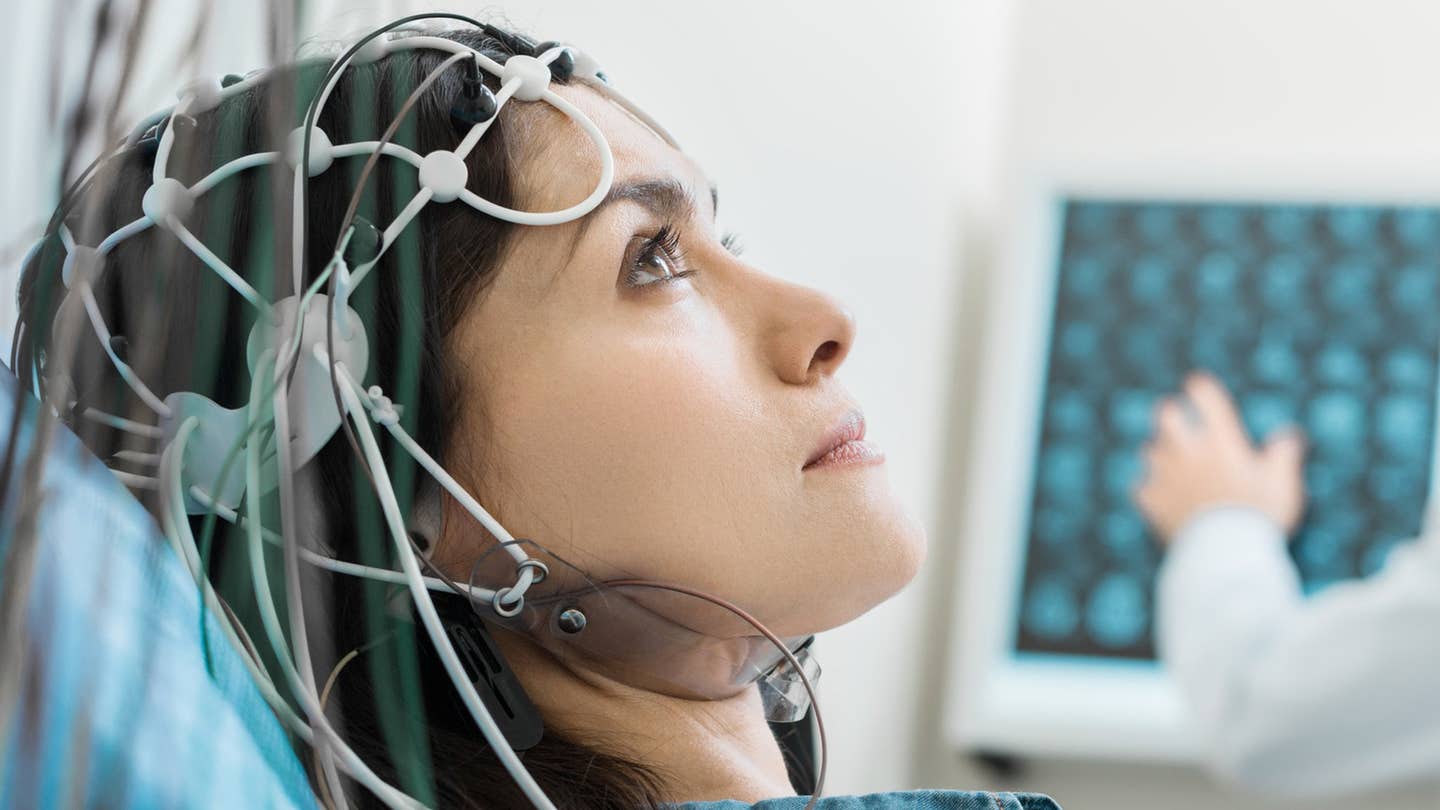Super Human: Scientists enhance cognitive abilities through direct brain stimulation
The scientific mission to unlock the secrets of enhancing human cognitive abilities has captivated both psychology and neuroscience

[Oct. 19, 2023: Staff Writer, The Brighter Side of News]
Researchers have delved into the impacts of a pioneering brain stimulation technique known as transcranial alternating current stimulation (tACS). (CREDIT: Getty Images)
For decades, the scientific mission to unlock the secrets of enhancing human cognitive abilities has captivated both psychology and neuroscience. The stakes are high and the implications profound; from sharpening attention in critical roles such as air traffic control to restoring memories lost in the fog of dementia, fine-tuning the human brain's function could revolutionize our approach to mental health and cognitive longevity.
In a major leap forward on this quest, recent studies suggest a promising ally: brain stimulation. Specifically, researchers at the Reinhart Lab at Boston University have delved into the impacts of a pioneering brain stimulation technique known as transcranial alternating current stimulation (tACS).
This method, employed both on patients with varying cognitive impairments and on healthy individuals, has shown potential in fine-tuning mental faculties, a discovery that could have seismic effects across multiple domains of neuroscience and cognitive therapy.
The science behind tACS is as fascinating as it is intricate. Participants don an elastic cap laced with electrodes, which transmit weak electrical currents — oscillating at precise frequencies — across the scalp. This procedure, seemingly simple in its execution, is revolutionary in its impact. By targeting specific regions of the brain, these regulated currents can modify brain activity, compelling neurons to fire in a rhythmic pattern.
Related Stories
But why is this rhythmic neural activity crucial? It's all about communication. Effective neural communication is dependent on the coordinated rhythm of neuron firing. During instances of neuropsychiatric disorders, these rhythmic patterns are noticeably disrupted. tACS aims to rectify this by externally prompting rhythmic brain activity conducive to healthy cognitive function, compensating for the brain's occasional inability to do so autonomously.
Despite its promise, tACS stands relatively nascent in the field of cognitive neuroscience, and its mechanisms remain partially shrouded in mystery. The debate is ongoing; can it genuinely fortify or rejuvenate brain rhythms enough to significantly alter cognitive functions?
The scientific community finds itself at a crossroads, with some research corroborating the efficacy of tACS in modifying brain activity and cognitive function, while other studies argue that the electrical currents used are potentially too feeble to effect genuine change.
In light of this dichotomy in the existing scientific literature, the meta-analysis emerges as a critical tool, providing a panoramic view of the research landscape by amalgamating numerous studies. A notable meta-analysis undertaken in 2016 presented encouraging evidence supporting tACS's role in cognitive alteration. However, in the whirlwind of scientific advancement, the number of relevant studies has burgeoned, and the technology underpinning tACS has evolved in sophistication since then.
Spurred by this, researchers at Boston University embarked on an updated, comprehensive meta-analysis, encompassing over 100 studies — a staggering repository of data drawn from more than 2,800 human participants. This endeavor, ambitious in its scope, has yielded insights that might just alter the trajectory of cognitive neuroscience.
Tree-map of outcome-based effects included in the meta-analysis. (CREDIT: Science)
The findings are nothing short of compelling. After scrutinizing over 300 cognitive function measures from the multitude of studies, a pattern of immediate cognitive improvement post-tACS emerged. Delving deeper into specific cognitive domains, the data revealed that tACS most significantly bolstered executive function — the brain's managerial center, crucial for adapting to new, unexpected, or conflicting information.
Furthermore, enhancements were not just confined to executive tasks. Improvements were also observed in participants' capabilities to focus and retain information over both short and extended durations. This suite of results indicates that tACS might hold the key to augmenting certain mental functions, at least in an immediate sense.
Treemap of experiments hypothesizing disruption in cognitive function. (CREDIT: Science)
However, the implications of tACS extend beyond immediate cognitive enhancement in the general populace. The researchers cast their analytical net wider, examining its efficacy among demographics particularly susceptible to cognitive fluctuation: older adults and individuals grappling with neuropsychiatric conditions. The analysis provided consistent evidence that tACS can reliably improve cognitive function in these populations.
One of the most intriguing discoveries was the identification of a specialized form of tACS capable of simultaneously targeting two separate brain regions and manipulating their intercommunication. Remarkably, this method demonstrated a bidirectional effect: it could either amplify or diminish cognitive function. This flexibility hints at enormous potential for clinical application. Conditions such as depression, characterized by diminished reward processing, or bipolar disorder, marked by an overactive reward system, might be effectively managed by a tACS protocol that can swing both ways, allowing researchers and clinicians to tailor cognitive interventions to individual clinical requirements.
Risk of bias assessments for randomized controlled trials. (CREDIT: Science)
As we stand on the cusp of this new era in cognitive enhancement, tACS represents a beacon of hope. It's a non-invasive, drug-free approach that, according to current statistical scrutiny, holds substantial promise. With continued refinement, tACS has the potential to induce more considerable, enduring enhancements in mental function.
The journey of scientific exploration being undertaken at institutions like the Reinhart Lab is more than a series of studies; it's a beacon of hope for those battling cognitive impairments and a fascinating new frontier in our understanding of the brain. As we continue to unravel the complexities of the human mind, technologies like tACS not only offer immediate improvements but also pose profound questions about the future of cognitive health, mental wellness, and the untapped potential of the human brain.
For more science stories check out our New Discoveries section at The Brighter Side of News.
Note: Materials provided above by The Brighter Side of News. Content may be edited for style and length.
Like these kind of feel good stories? Get the Brighter Side of News' newsletter.



